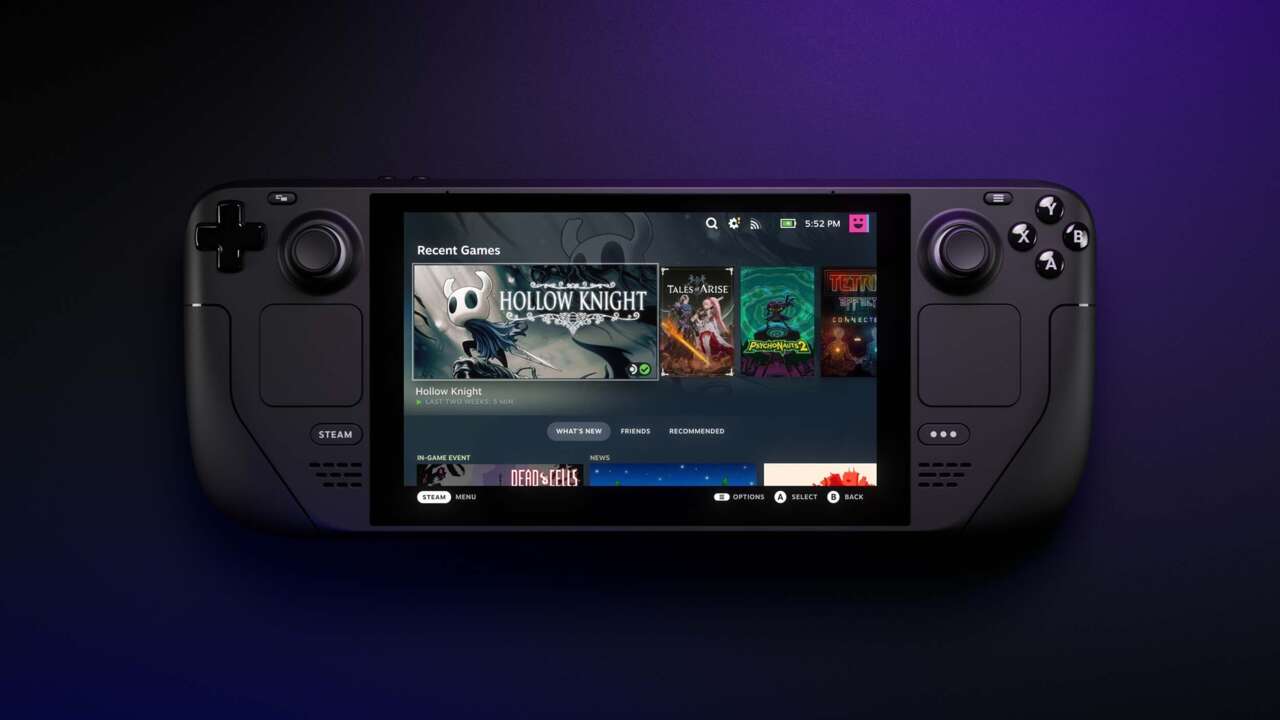
Despite spending well over a decade in the games media, I’ve never been much of a PC gamer. I had played PC games a little in my youth, but I transitioned to a short-lived career in graphic design–where Mac reigned supreme–around the same time the PC hardware arms race accelerated. As a result, PC games have long felt out of reach for me, both financially and as a matter of practical understanding. Even if I could afford it, I didn’t have the know-how to build a PC, I heard mixed-at-best things about prefab gaming rigs, and I didn’t have the time to educate myself on either one. I settled into a place where PC gaming always felt like it’d be foreign and obtuse. It was against this backdrop that the Steam Deck arrived, effectively toppling most of the barriers that stood between me and the community of PC gamers.
The cost was certainly one important consideration. At roughly $500 for the mid-tier model, the Steam Deck is around half the price of many standard pre-built gaming PCs, and roughly on-par with a gaming console like the PS5 and Xbox Series X. This made it an easier pill to swallow, and a good starting point for me as someone who had built up a very small library of Steam games over the years and was just looking to dip a toe in, regardless.
It was a good price point partly because of its other significant feature, its form factor. Steam Deck is a portable PC first and foremost, which no doubt appeals to veteran PC players looking to take their games on the go. I came at it from the other side, though, as a dedicated Nintendo Switch fan who just loves portable gaming. I play plenty of games on my consoles, but portables have always just fit into my life better, as a matter of sheer convenience. Gaming on the go feels more at home to me, so the Steam Deck pitch of a portable PC definitely stood out to me due to the portable part. This wasn’t a new way to play my PC library, but rather, a new platform altogether that already happened to be similar in function and form to another platform I loved: the Switch.
Perhaps most importantly, the Steam Deck felt welcoming and user-friendly, in contrast to traditional PC gaming which had, at least from the outside, seemed intimidating. I didn’t have to fret about tinkering with settings or installing drivers or trial-and-error for optimum performance. I could buy a Deck-verified game, download it, and in most cases it would simply work. I’d be off and playing in a matter of minutes, reclining on my couch while watching TV. It felt comfortable right from the start.
And to my surprise, all of these qualities have also made the Steam Deck a great set of PC training wheels. Tinkering isn’t required, but it isn’t discouraged either. Some of my favorite voices in games media have talked about how easy and fun it has been for them to venture outside the safe confines of the Steam Deck UI and experiment with custom firmware, alternative storefronts, or other settings. I’ve only dabbled so far, but it’s great knowing that I can have both: the ability to use walkthroughs to run something custom like Game Pass streaming, and then the ability to switch back to the familiar Steam Deck UI for a more stress-free and streamlined experience.
To be sure, Steam Deck does have its share of problems. It’s bulky, the fan can be loud and the vents sometimes get hot, games crash more frequently than on traditional consoles, features like background updates are inconsistent, and its battery life leaves much to be desired. It feels like a first draft of Valve’s ambitious ideas, not a finalized version. I’m reminded of the original bulky Nintendo DS, which was later replaced with the much more streamlined DS Lite. In all likelihood, there will probably be a sleeker version of the Steam Deck too.
And when that happens, I’ll probably buy it. I love my Steam Deck, not just for all the great gaming experiences it’s given me this year, but for helping gently usher me into a community that previously felt impenetrable. I’m a PC gamer now, albeit a baby one. But who knows? Maybe one day I’ll even get a proper desktop gaming rig. I am building up a respectable Steam library, after all.
The products discussed here were independently chosen by our editors.
GameSpot may get a share of the revenue if you buy anything featured on our site.


